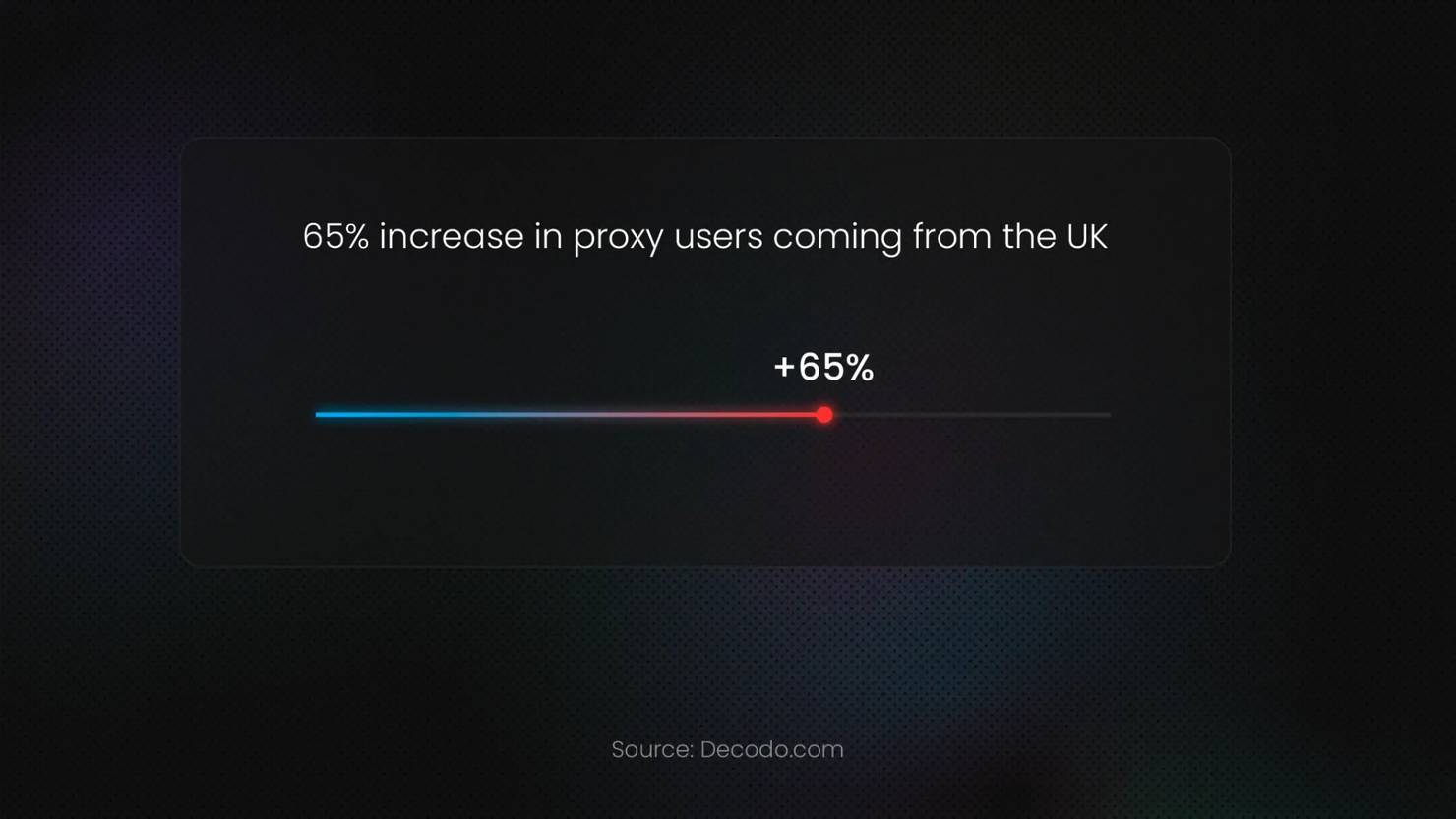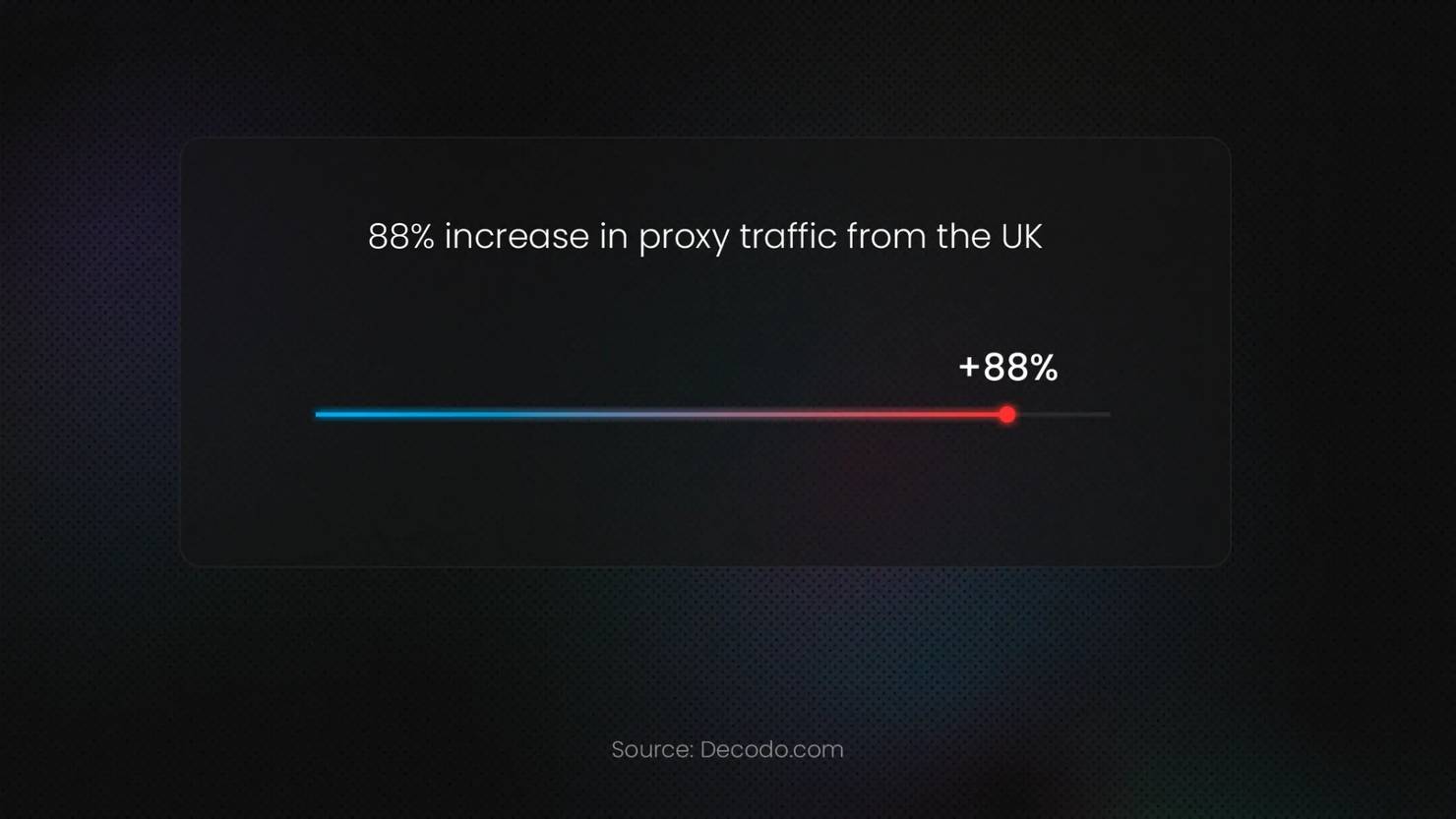Why UK Users Are Replacing VPNs with Proxies
With growing discussions around tighter regulations and potential restrictions on VPN use in the UK, many businesses are already seeking alternatives to avoid getting caught in the crackdown. Proxies have quickly become the go-to solution for those who need reliable access to geo-restricted content or want to maintain control over their digital footprint without facing possible restrictions.
Benediktas Kazlauskas
Last updated: Jul 30, 2025
4 min read

Concerns raised over VPNs
Businesses operating user‑generated platforms, like community forums, content-sharing SaaS, and similar services, now fall under the UK’s Online Safety Act, which went into force on July 25, 2025. These platforms are legally required to conduct risk assessments and implement highly effective age verification to prevent minors from accessing potentially harmful content. Ofcom, the UK regulator, has made clear that companies must also address circumvention risks, including the use of VPNs by end users to bypass age checks.
The technology shift
Proxies are rapidly gaining ground in enterprise environments due to their architectural advantages. Unlike VPNs, which rely on full encryption and create a single access tunnel, proxies offer more granular routing options and operate with less regulatory friction. This makes them more adaptable to use cases such as location-specific data collection, overcoming geo-restrictions, and monitoring competitor developments, all while reducing the risk of triggering anti-bot mechanisms and other red flags.
What’s emerging is not just a reaction to looming VPN restrictions but a broader shift in how UK businesses think about online access and data operations. Proxy solutions offer greater customization, control, and efficiency.
Ultimately, Decodo’s internal data shows a significant 65% increase in proxy users coming from the UK.

“Companies around the globe are getting smarter about how they operate in highly competitive landscapes. Instead of just picking the most popular tools, they’re choosing what actually works best for them, whether that’s faster, easier to use, or works better with region-specific restrictions. It shows that people are thinking more critically about their options.” – Vytautas Savickas, CEO at Decodo.
Technical advantages driving adoption
Modern proxy services have come a long way. Most of the providers now offer strong enterprise-grade security features while still providing easy-to-use products, which keeps them popular with even Fortune 500 businesses. At the same time, companies in the UK are becoming more tech-savvy and better at distinguishing between tools like proxies and VPNs.
Our internal data analysis revealed an increase of over 88% in proxy traffic from the UK, indicating that more British companies have started to rely on proxies rather than alternative solutions, such as VPNs.

Educational content and user awareness
“More organizations in the UK are investing time in understanding the tools that power secure and efficient online operations. Most companies test out different solutions, providers, and do their research on proxies and VPNs, and they’re also making more informed, strategic choices.” – Gabriele Verbickaitė, Product Marketing Manager at Decodo.
This rising level of awareness is reshaping expectations. UK businesses aren’t just adopting such tools for compliance or convenience, they’re demanding infrastructure that aligns with operational goals, scalability, and long-term resilience to any potential changes the industry can throw at them.
As more IT leaders, data engineers, and digital marketing teams engage with industry resources and technical content, the bar for what qualifies as an effective solution is rising. This feedback loop is positioning the UK as one of the most advanced and discerning markets for enterprise-grade proxy technology.
UK businesses adopting proxies
UK companies are increasingly integrating proxies into their digital operations. This shift is especially noticeable in data-driven sectors like eCommerce, finance, digital marketing, fintech, and cybersecurity, where real-time access to external data is critical. Businesses report using proxies to support activities such as market research, competitor price tracking, localized ad verification, and even SEO monitoring across multiple regions.
Rather than relying solely on traditional privacy solutions, like VPNs, companies are investing in more sophisticated proxy solutions, including residential, mobile, datacenter, and ISP proxies, to gain better stability, location accuracy, and higher success rates when accessing geo-restricted or bot-protected publicly available data and websites.
“UK businesses are quickly adopting proxy services, moving beyond simple VPNs to more advanced setups that offer greater control over their online activity. It’s no longer just about staying private – performance and reliability are now just as important.” – Vaidotas Juknys, Head of Commerce at Decodo.
This trend reflects a growing awareness of the strategic value proxies offer beyond anonymity. As online competition intensifies and government officials try to introduce new restrictions, proxies have become essential infrastructure for digital intelligence and automation.
Bottom line
The increase in UK proxy adoption represents more than a temporary trend. It signals that businesses are making calculated decisions in response to mounting uncertainty about the future of VPN services in the United Kingdom.
As government discussions continue around potential restrictions or outright bans on VPN usage, UK companies are proactively migrating to proxy services to safeguard their online operations. The 65% surge in proxy adoption and 88% growth of proxy traffic usage from UK users demonstrates that small, growing, or even enterprise-level businesses aren't waiting to see what regulatory changes might come, they're acting now to ensure uninterrupted access to their online services.
Easily avoid geo-restrictions
Virtually travel 195+ locations and gain access to 115M+ ethically-sourced residential IPs with a 3-day free trial.
About the author

Benediktas Kazlauskas
Content Team Lead
Benediktas is a content professional with over 8 years of experience in B2C, B2B, and SaaS industries. He has worked with startups, marketing agencies, and fast-growing companies, helping brands turn complex topics into clear, useful content.
Connect with Benediktas via LinkedIn.
All information on Decodo Blog is provided on an as is basis and for informational purposes only. We make no representation and disclaim all liability with respect to your use of any information contained on Decodo Blog or any third-party websites that may belinked therein.

